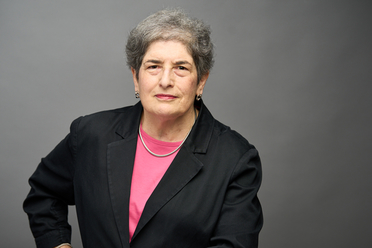
Sally Cohen
PhD RN FAAN
Clinical Professor
sally.cohen@nyu.edu
1 212 992 5929
433 First Ave
New York, NY 10010
United States
Sally Cohen's additional information
-
-
Sally Cohen, PhD, RN, PNP, FAAN is a Clinical Professor at NYU Rory Meyers College of Nursing. Her interdisciplinary scholarship spans nursing, child health, public health, and political science. She teaches graduate nursing courses in health policy and “issues and trends in nursing and health care.” Prof Cohen has chaired many PhD dissertation and DNP Project committees.
Prof. Cohen’s most recent scholarship focuses on systems of care for children and youth with special health care needs. In particular, she studies health issues in education transitions for young children with developmental behavioral disabilities.
Prior to joining the faculty at NYU Meyers, Cohen was Distinguished Nurse Scholar-in-Residence at the Institute of Medicine (now the Academy of Medicine), Before that, she directed the Robert Wood Johnson Foundation Nursing and Health Policy Collaborative at the University of New Mexico. She has held tenured faculty positions at Yale and the University of New Mexico. At Yale, she developed and directed the Nursing Management, Policy, and Leadership specialty, which was the precursor to Yale’s DNP program. She also was on the executive committee of the Yale Interdisciplinary Center for Bioethics. As director of policy and research at the National League of Nursing, Cohen helped advocate for legislation that in 1985 established the National Institute of Nursing Research. She has also practiced as an RN and a PNP.
Among her many honors, Cohen received the Ellen Rudy Clore Excellence in Writing Award from the Journal of Pediatric Health Care (2023,1998), the Lois Capps Policy Luminary Award from the American Association of Colleges of Nursing, and was honored by Yale School of Nursing with its “90 Outstanding Yale Nurses” award. She received the Kaplan-Landy Award for Vision, Innovation, and Leadership from the Hadassah Nurses Council and was elected to the American Academy of Nursing in 1988. She received the Marisa de Castro Benton Prize, for an outstanding dissertation in Sociomedical Sciences, Columbia University
Cohen earned her PhD from Columbia University, MSN from Yale University, and BA from Cornell University.
-
-
PhD, Columbia UniversityMSN, Yale UniversityBA, Cornell University
-
-
PediatricCommunity/population healthHealth Policy
-
-
American Academy of NursingAmerican Nurses AssociationAmerican Political Science AssociationAmerican Public Health AssociationNational Association of Pediatric Nurse PractitionersSociety for Developmental and Behavioral Pediatrics
-
-
Faculty Honors Awards
Lois Capps Policy Luminary Award, American Association of Colleges of Nursing (2019)90 Nurses for 90 Years, Yale University School of Nursing (2013)Kaplan-Landy Award for Vision, Innovation, and Leadership, Hadassah National Nurses Council (2008)Elected to the New York Academy of Medicine (2006)Ellen Rudy Clore Excellence in Writing Award, Journal of Pediatric Health Care (1998)Marisa de Castro Benton Prize, for outstanding dissertation in Sociomedical Sciences, Columbia University (1993)Dissertation approved with distinction (1993)Elected to American Academy of Nursing (1988)Elected to Sigma Theta Tau, International, Honor Society for Nursing, as charter member Delta Mu Chapter (1979) -
-
Publications
Letter From the Editor : Guest Editorials
AbstractCohen, S. (2017). In Policy, Politics, and Nursing Practice (Vols. 18, Issue 1, p. 6). 10.1177/1527154417711059Abstract~Nurses Improve Their Communities’ Health Where They Live, Learn, Work, and Play
AbstractMcCollum, M., Kovner, C. T., Ojemeni, M. T., Brewer, C., & Cohen, S. (2017). In Policy, Politics, and Nursing Practice (Vols. 18, Issue 1, pp. 7-16). 10.1177/1527154417698142AbstractNurses are often recognized for their volunteer efforts following disasters and international humanitarian crises. However, little attention is paid to the activities of nurses who promote a culture of health in their communities through local volunteer work. In this article, we describe nurses’ perceptions of how they promote health in their communities through formal and informal volunteer work. Using 315 written responses to an open-ended question included in a 2016 survey of the career patterns of nurses in the U.S., we utilized conventional content analysis methods to code and thematically synthesize responses. Two broad categories of nurse involvement in volunteer activities arose from the participants’ responses to the open-ended question, “Please tell us what you have done in the past year to improve the health of your community”: 17% identified job-related activities, and 74% identified non-job-related activities. 9% of respondents indicated they do not participate in volunteer work. Job-related activities included patient education, educating colleagues, and “other” job-related activities. Non-job-related activities included health-related community volunteering, volunteering related to a specific population or disease, family-related volunteering, church activities, health fairs, raising or donating money, and travelling abroad for volunteer work. Nurses are committed to promoting a culture of health in their communities both at work and in their daily lives. Leveraging nurses’ interest in volunteer work could improve the way nurses engage with their communities, expand the role of nurses as public health professionals, and foster the social desirability of healthful living.Tax Policies as Health Care Policies
AbstractCohen, S. (2017). In Policy, Politics, and Nursing Practice (Vols. 18, Issues 4, pp. 171-172). 10.1177/1527154418776534Abstract~U.S. Health Policy Following the 2016 Elections
AbstractCohen, S. (2017). In Policy, Politics, and Nursing Practice (Vols. 18, Issues 3, pp. 111-112). 10.1177/1527154418757775Abstract~Bullying Policies across the Lifespan
AbstractCohen, S. (2016). In Policy, Politics, and Nursing Practice (Vols. 17, Issues 4, pp. 175-176). 10.1177/1527154417703203Abstract~Health Policy Repertoires and Toolboxes
AbstractCohen, S. (2016). In Policy, Politics, and Nursing Practice (Vols. 17, Issue 1, pp. 3-4). 10.1177/1527154416655508Abstract~Soaring Prescription Drug Prices
AbstractCohen, S. (2016). In Policy, Politics, and Nursing Practice (Vols. 17, Issues 3, pp. 115-117). 10.1177/1527154416681225Abstract~States, Nations, Health Policy, and Nursing
AbstractCohen, S. (2016). In Policy, Politics, and Nursing Practice (Vols. 17, Issues 2, pp. 59-60). 10.1177/1527154416667347Abstract~Trends in the supply and practice environment of nurse practitioners in New Mexico
AbstractJudge, S. M., Boursaw, B., & Cohen, S. (2016). In Nursing Economics (Vols. 34, Issue 1, pp. 35-43).Abstract~On White Papers and Pages
AbstractCohen, S. (2015). In Policy, Politics, and Nursing Practice (Vols. 16, Issue 1-2, pp. 3-4). 10.1177/1527154415589664Abstract~